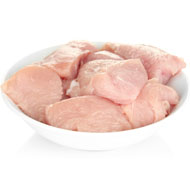
Celebrity chef suggests that it is safe to eat
The Food Standards Agency has advised the public not to eat raw chicken following an article in the Mirror that implies it is safe to eat.
The article features a tweet by celebrity chef Marc Murphy advocating chicken sashimi - a dish often referred to as chicken tartare.
Popular in Japan, chicken sashimi consists of thinly sliced raw chicken that is seared or broiled for around 10 seconds before being served.
In a statement, the FSA said: “Following an article in The Mirror (9 September) which suggests that some people believe that raw chicken dishes are safe to eat, we are reiterating our advice not to eat raw chicken.
“Raw chicken is not safe to eat – it could lead to food poisoning. Chicken should always be cooked thoroughly so that it is steaming hot all the way through before serving. To check, cut into the thickest part of the meat and ensure that it is steaming hot with no pink meat and that the juices run clear.”
The Mirror article suggests that ‘if birds have been free range, kept in quality conditions, and processed in a clean environment, there’s not so much to worry about’. But the FSA argues this is not the case.
“All raw chicken is unsafe to eat, regardless of the conditions that the birds have been kept in,” the statement continued. “Consuming raw chicken can lead to illness from campylobacter, salmonella and E coli. Symptoms include abdominal pain, diarrhoea, vomiting and fever. In some cases, these bugs can lead to serious conditions.”



 The Federation of Independent Veterinary Practices (FIVP) has announced a third season of its podcast, Practice Matters.
The Federation of Independent Veterinary Practices (FIVP) has announced a third season of its podcast, Practice Matters.